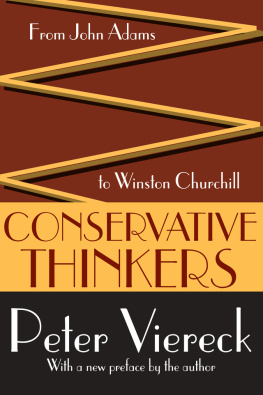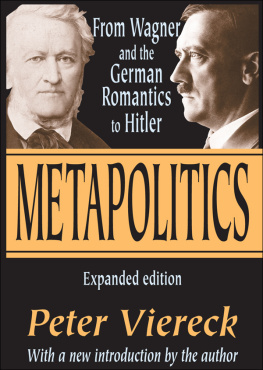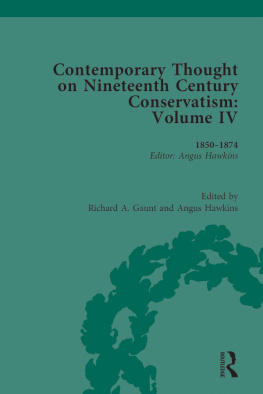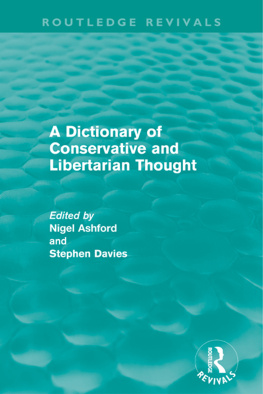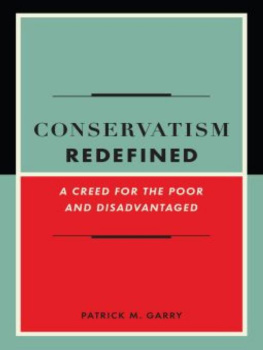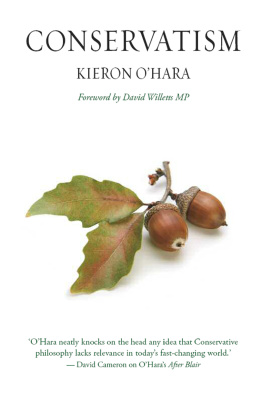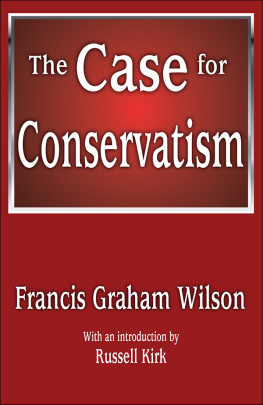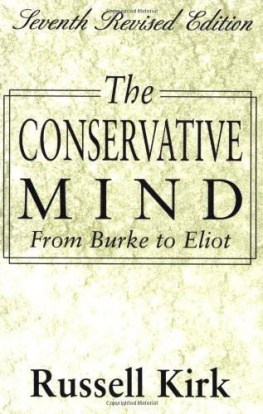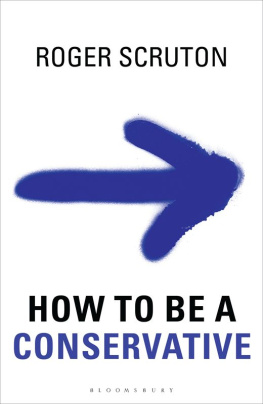CONSERVATIVE THINKERS
From John Adams to Winston Churchill
Conservative Thinkers
Peter Viereck
With a new preface by the author
Originally published in 1956 by D. Van Nostrand Company, Inc.
Published 2006 by Transaction Publishers
Published 2017 by Routledge
2 Park Square, Milton Park, Abingdon, Oxon OX14 4RN
711 Third Avenue, New York, NY 10017, USA
Routledge is an imprint of the Taylor & Francis Group, an informa business
New material this edition 2006 by Taylor & Francis.
All rights reserved. No part of this book may be reprinted or reproduced or utilised in any form or by any electronic, mechanical, or other means, now known or hereafter invented, including photocopying and recording, or in any information storage or retrieval system, without permission in writing from the publishers.
Notice:
Product or corporate names may be trademarks or registered trademarks, and are used only for identification and explanation without intent to infringe.
Library of Congress Catalog Number: 2005043676
Library of Congress Cataloging-in-Publication Data
Viereck, Peter Robert Edwin, 1916-[Conservatism]
Conservation thinkers: from John Adams to Winston Churchill/Peter
Viereck; with a new preface by the author.
p. cm.
Originally published: Conservatism. Princeton, N.J.: VanNostrand, [1956].
Includes bibliographical references and index.
ISBN 1-4128-0526-0
1. Conservatism. 2. ConservatismHistory. I. Title.
JC573. V543 2005
320.52dc22 2005043676
ISBN 13: 978-1-4128-0526-1 (pbk)
To the memory and tradition of WINSTON CHURCHILL
"The principal instrument of America is freedom; of Russia, slavery."
Alexis de Tocqueville
"Society cannot exist unless a controlling power upon will and appetite be placed somewhere; and the less of it there is within, the more of it there must be without."
Edmund Burke
"Back out of all this now too much for us...
Here are your waters and your watering place.
Drink and be whole again beyond confusion."
Robert Frost
This anthology with commentaries is reprinted unaltered from the 1956 edition. It has two aims. First, to deal only with serious thinkers of conservatism, not with its politicians or journalists, least of all contemporary American pluto-cranks. The second aim is inclusiveness, with fairness to each, the gamut from liberal conservatives like Burke and John Adams, to the brilliant extreme reactionaries like de Maistre, Pobedonostsev, and Donoso Cortes, who merit an American hearing. I happen to lean toward the Burkeans.
PETER VIERECK
This brief new history of conservatism is planned for two audiences: the serious general reader and the college community. of this book) of the chief conservative writers.
Across America, conservatism is being hotly debated without definition or historical context. The first chapter defines conservatism itself; the second, its special technical terms; the third describes its changing historical context; the rest deal with its actual thinkers and statesmen. After each main conservative thesis, the anti-conservative rebuttal is summarized (cf. page 17), and the reader is allowed to reach his own conclusions. Though the first stress is on conservative political philosophy (from John Adams to Churchill), key sections also stress non-political conservatism: in religion (Cardinal Newman) and in the primarily cultural protest against material progress (Coleridge, Dostoyevsky, Melville, Henry Adams).
Every major point made in , the document anthology. Some of the challenging foreign documents are not elsewhere available in English, either because they are out of print (Maistre, Corts, Barres, Pobiedonostsev), untranslated (Gentz, Burckhardt), or unsatisfactorily translated (Nietzsche). Accordingly the author has made his own translations where necessary, as noted in footnotes.
Criteria for inclusion were three: representativeness, depth of perception, importance of influence. The result is not uniformity but a gamut: from extreme intolerant reaction to an evolutionary moderate spirit. The former passes imperceptibly into authoritarianism; the latter, into liberalism. Some readers may quite reasonably prefer to classify the borderline cases not as "conservatives" but as "authoritarians" at the one border and "liberals" at the other. The present classification, however, assumes that no "pure" conservatives ever exist; all are diluted in varying degrees with either authoritarianism or liberalism Maistre and Burke being the respective prototypes of these two dilutions. In organizing this considerable material with maximum conciseness, the aim is limited, unpretending: no new trail of truth, beauty, or polity but rather clarity, sobriety, impersonality, documentation. To clarify is not the same as to oversimplify. Conservatism is hardly simple, being more an implicit temperament, less an articulate philosophy than the other famous isms.
PETER VIERECK
In the special case of the college audience, the range of contents over Europe, England, America, from 1770 through today, may perhaps prove serviceable in some instances for courses in that same range of countries, dates, or fields: intellectual history; American history; European history; British history; political science; government; social psychology; general education.
The author acknowledges with particular gratitude the generous technical and intellectual help of Mrs. Frances Head in preparing the manuscript for the printer.
Part I
Conservatism
1
Historical and Philosophical Origins of Conservatism
Begins with Burke. The birth of a deliberate international conservatism is dated by Edmund Burke's essay of 1790, Reflections on the Revolution in France, in the same way that the birth of international Marxism is dated by the Communist Manifesto of 1848. Lord Hugh Cecil, a leading twentieth-century philosopher of conservatism, defined that ism as "a force called into activity by the French Revolution [ of 1789 ] and operating against the tendencies that that Revolution set up." Those who consider this definition too narrow will, in addition, stress the many broader implications of the Latin verb from which it is derived: conservare, meaning "to preserve."
Burke himself did not use the noun "conservatism," although he did use the verb "to conserve." Wide usage of the noun first began among European traditionalists of the early nineteenth century, groping for a new philosophical terminology to use against the French Revolutionary era of 1789-1815, especially against its most radical and terrorist party, the Jacobins. Proponents associated that era with its appealing democratic slogan, "Liberty, Equality, Fraternity," and with its liberation of the masses from feudal exploiters. Opponents associated the era with the murder of innocent victims by the Jacobins during 1793-1794 and with the aggressions of Napoleon during 1799-1815. Proponents of the era believed that its idealistic ends, its democratic social gains, outweighed the bad means used and the millions of Europeans killed in that quarter-century of wars. Opponents believed that the bad means outweighed the democratic, liberal, and rationalist ends. The more tradition bound opponents also questioned the ends themselves. After 1815, these ends sufferedaccording to proponents, suffered undeservedlyfrom the general revulsion against the means. That revulsion gave conservatives their first great opportunity for restoring the pre-revolutionary traditions; a sudden flowering of more than one brand of conservative philosophy followed.

